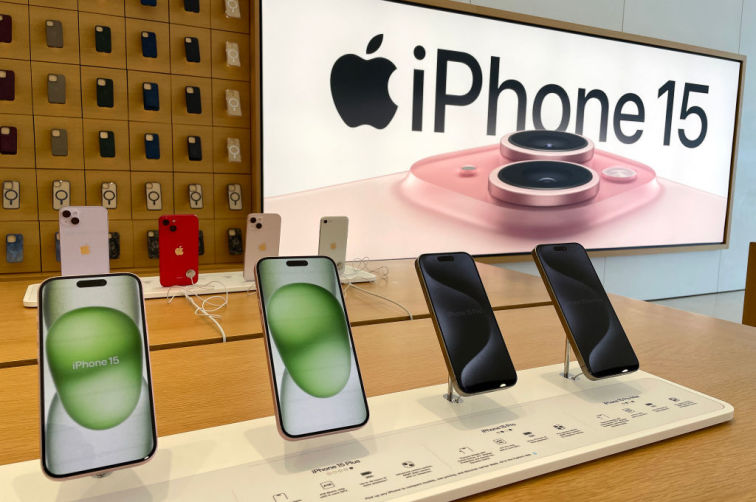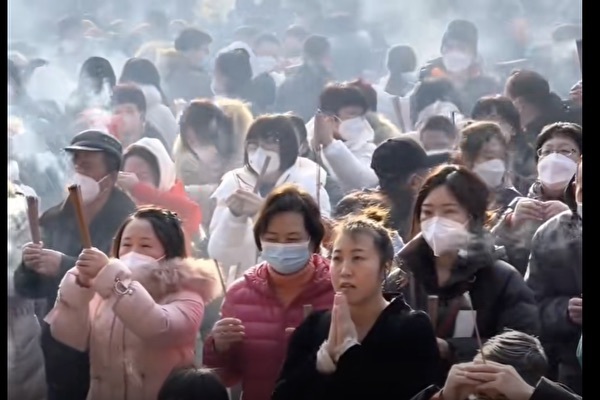Illustrative image: Surveillance cameras surrounding Beijing's Tiananmen Square closely monitor the movements of people in the area. (Screenshot from the internet)
[People News] Recently, Zhang Hai, a bereaved family member of a COVID-19 victim, was interrogated by the police after purchasing two fruit knives via an online shopping platform. Zhang criticized the authorities for their persistent surveillance of him.
According to a report by Radio Free Asia, on Wednesday evening (January 22), Zhang Hai, who currently resides in Shenzhen, told the outlet that he had ordered two fruit knives on the Pinduoduo online shopping platform but was questioned by police from the Nanshan Public Security Bureau in Shenzhen: "Because I ordered two small fruit knives online, I got a call today at noon saying it was from the anti-fraud center. I didn’t answer the call. Later, another call came in, and the person asked, 'Are you Zhang Hai?' He said he was from the Nanshan District Police Station. Then he asked, 'Did you buy two knives on Pinduoduo?' I said, 'Is it illegal to buy two fruit knives?' He asked, 'What are you buying the knives for?' I replied, 'I obviously need them. Can’t I use them to peel fruit?'"
Zhang Hai expressed anger at the police's questioning, stating that anyone can purchase knives approved by the authorities online, so why was he singled out? "If you can sell them openly, I can buy them openly. If you don’t want people to buy them, then ban these fruit knives altogether. This is complete surveillance of individuals. They told me that even buying such knives in a store requires registration. I told them that customer information on Taobao and Pinduoduo is already tied to real-name accounts with verified addresses."
Zhang Hai’s Journey from Advocacy to Imprisonment
During the COVID-19 pandemic, Zhang Hai’s father contracted the virus and tragically passed away. This loss led Zhang to embark on a path of advocacy, filing lawsuits against the Hubei provincial and Wuhan municipal governments, demanding transparency about the true number of deaths caused by the pandemic. However, the courts refused to hear his case. Two years ago, Zhang was secretly detained by police for voicing support online for Wuhan residents’ gatherings to demand fair medical treatment. Subsequently, the Wuhan court sentenced him to 1 year and 3 months in prison on charges of "picking quarrels and provoking trouble." Zhang was released from prison on May 19 last year after serving his sentence.
Zhang Hai questioned the police at Shenzhen’s Nanshan police station, asking why they were so alarmed over a resident purchasing an 11-centimeter fruit knife.
A reporter from this outlet attempted to contact the Nanshan police station in Shenzhen, but the phone could not be reached.
Mr. Zhu, a resident of Suzhou, told the outlet that police restrictions on citizens pervade daily life. He provided an example: “Fruit knives over 6 centimeters in length aren’t allowed on trains, and in some places (like Xinjiang), kitchen knives have to be chained. If you’re checked for buying a fruit knife, it’s clear they’re overly paranoid. They monitor every platform, but when children go missing, they never manage to find them. For their purposes, they practice selective law enforcement.”
A Society on Edge Under Heightened Surveillance
Mr. Liu, a resident of Qingdao, Shandong, stated in an interview that there has been a recent surge in violent revenge incidents and mass disturbances across the country, leaving authorities in a state of high alert. He said: “Now, everything you do online is under their control—we can feel it. For example, whatever you buy, they know. In the past, they could track what vehicles you were taking, through either the transportation department or the public security bureau. In China, every bus is equipped with multiple cameras. If you drive your own car, they know. If you drive someone else’s car—even if you pull your hat down low—the streets are filled with cameras. If one happens to capture your face, they’ll know.”
Liu added that whether it’s shopping or traveling, the actions of Chinese citizens are constantly monitored by relevant departments. Moreover, many people, burdened by prolonged social injustices and unresolved psychological pressure, have reached breaking points, resulting in social tragedies.
4o








News magazine bootstrap themes!
I like this themes, fast loading and look profesional
Thank you Carlos!
You're welcome!
Please support me with give positive rating!
Yes Sure!